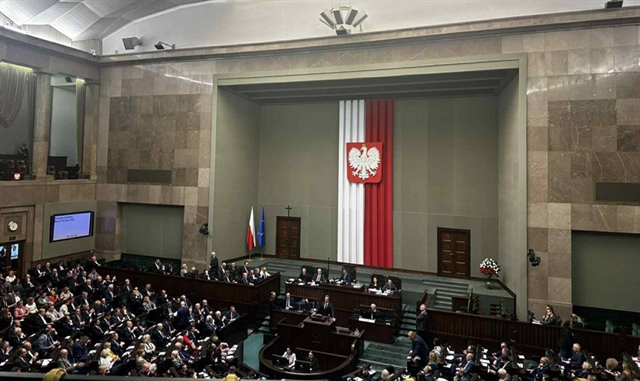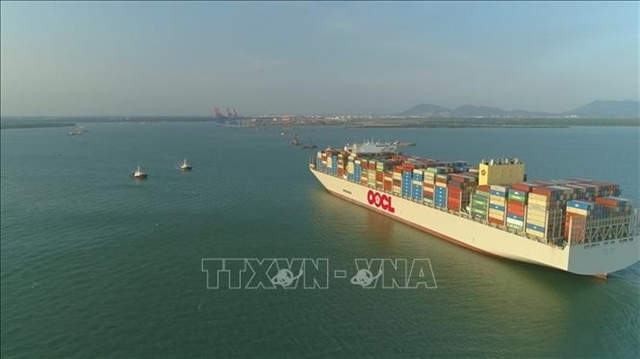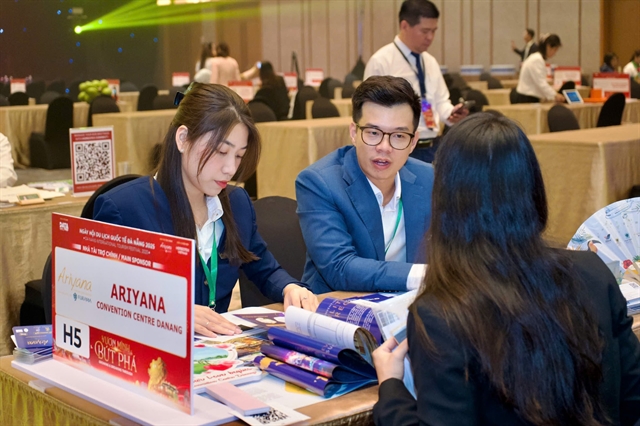

A man who lives on an island in the central province of Quảng Ngãi loves crabs. Phạm Văn Công noticed that many were being caught when they were about to have babies.
.jpg)
|
| Phạm Văn Công carrying a crab to be released into the sea. Photo sggp.org.vn |
QUẢNG NGÃI – A Lý Sơn Island resident in the central province of Quảng Ngãi has ignored cynicism and negative comments to continue on his mission to preserve his homeland’s maritime resource.
Phạm Văn Công, 33, is just an ordinary islander, apart from the fact he collects and releases huỳnh đế crabs – frog or spanner crabs – back into their environment.
The crabs are a local specialty with delicious, rich flesh that is full of nutrition. The crabs were sold in seafood restaurants from VNĐ1-1.5 million (US$43-65) per kilo.
More than three months ago, when he started a job buying seafood from fishermen on the island to sell to traders on the mainland, Công saw that many pregnant crabs were being caught and sold.
Because of their high prices, the island's crab numbers are dwindling due to overexploitation.
To do something about this, Công decided to start buying crabs carrying eggs to release back into the ocean so the animals can continue to breed.
Over the last two months, whenever he hears of fishermen who have caught crabs carrying eggs, Công has insisted on buying them.
“I know the fishermen usually go out to sea at 3 am and return in the afternoon so I have to wait at the docks to meet them before they can sell their catches to the restaurants,” Công told Sài Gòn Giải Phóng (Liberated Sài Gòn).
“Fortunately, they are willing to sell them at good prices because they understand my intentions,” Công said.
Công takes the crabs home and puts them in a glass tank with seawater and sand and an oxygenator to make sure they are healthy before he releases them back into the ocean.
To do that he rents a boat and drives out about 6-7 nautical miles silently at night, and he changes locations of each trip.
“I have to do it at night and always change the locations because I don't want them to be re-caught,” he said.
A mother crab can carry tens of thousands of eggs and they breed between February and June and from September to October.
Công wants to help the female crabs to continue to breed and restore the species' numbers.
Over the past two months, Công has spent dozens of millions of đồng buying and releasing more than 30 crabs.
“People thought I was insane,” he said.
He has also set up a group on a social network to raise funds for his mission.
At present, his group only has seven friends, but many fishermen are starting to change their minds about sustainable maritime resource preservation.
“First, they (fishermen) were suspicious about my intentions. But I just wanted to save the crabs carrying eggs so I had to convince them day by day,” said Công.
“Fishing helps them feed their families. Initially, many fishermen did not want to sell the crabs to me because the traders pay more,” Công said.
Lý Sơn Island covers an area of 10sq.km with a population of 22,000.
In recent years, the number of tourists to the island has been increasing which has led to increasing demand for live seafood, putting pressure on maritime resources, including frog crabs.
Bùi Lương, a 66-year-old fisherman who has been crab fishing for more than 25 years, said: “In the past, I could catch 30-40kg of the crabs per day, but now the number has dropped to 7-8kg and I have to go further offshore.”
When he heard about what Công was doing, Lương decided to lend a hand.
“Releasing the pregnant frog crabs is important for preserving stocks, so I'm helping Công,” said Lương.
“As a Lý Sơn islander, I want to contribute to the protection of maritime resources,” the fisherman said.
Huỳnh Ngọc Dũng, vice director of the Lý Sơn Sea Preservation Area, said: “The crabs live in sandy areas near coral reefs around the island.”
“Currently, crab stocks are being exhausted due to overexploitation,” Dũng said.
“Công’s efforts are highly appreciated and need support from the community,” he said.
Công also said that tourists to Lý Sơn Island should be encouraged not to eat egg-carrying crabs. "Without buyers, the fishermen will stop catching the crabs,” he said. – VNS
GLOSSARY
A Lý Sơn Island resident in the central province of Quảng Ngãi has ignored cynicism and negative comments to continue on his mission to preserve his homeland’s maritime resource.
A resident of Lý Sơn Island is someone who lives there.
To ignore someone, or something, is to take no notice of them.
Cynicism is a belief that people want to do things only for themselves and should not be trusted.
A person’s mission is an aim that they feel strongly about.
To preserve something means to keep it as once was.
A resource is something that has value and can be used to survive.
Maritime means “to do with the sea”.
The crabs are a local specialty with delicious, rich flesh that is full of nutrition.
A speciality is a very special dish that people eat usually only on special occasions.
Nutrition is what is in food that makes your body grow and stay strong.
More than three months ago, when he started a job buying seafood from fishermen on the island to sell to traders on the mainland, Công saw that many pregnant crabs were being caught and sold.
Pregnant means “carrying children that are still to be born”.
Because of their high prices, the island's crab numbers are dwindling due to overexploitation.
Dwindling means “going down”.
If something is exploited, then it is used by someone in such a way that it harmed. Overexploitation is a state of being exploited too much.
Over the last two months, whenever he hears of fishermen who have caught crabs carrying eggs, Công has insisted on buying them.
If you insist on buying something you tell someone that you absolutely must buy it.
“I know the fishermen usually go out to sea at 3 am and return in the afternoon so I have to wait at the docks to meet them before they can sell their catches to the restaurants,” Công told Sài Gòn Giải Phóng (Liberated Sài Gòn).
Docks are places where ships park in a port in order to load up and offload.
“Fortunately, they are willing to sell them at good prices because they understand my intentions,” Công said.
Willing means “keen”.
Your intentions are things you want and plan to do.
Công takes the crabs home and puts them in a glass tank with seawater and sand and an oxygenator to make sure they are healthy before he releases them back into the ocean.
An oxygenator is a medical device that puts oxygen into the body.
To do that he rents a boat and drives out about 6-7 nautical miles silently at night, and he changes locations of each trip.
A nautical mile is a measurement of distance in the water, or in the air. It is used mainly by sailors and pilots.
Công wants to help the female crabs to continue to breed and restore the species' numbers.
To restore something means to bring it back to what it was in the past.
A species is a type of living thing, whether it is a plant or animal.
At present, his group only has seven friends, but many fishermen are starting to change their minds about sustainable maritime resource preservation.
If something is done in a sustainable way it is done in a way that it does not use up all its resources.
“First, they (fishermen) were suspicious about my intentions.”
To be suspicious about someone means to think they might be wanting to do something that may not be nice.
But I just wanted to save the crabs carrying eggs so I had to convince them day by day,” said Công.
To convince someone means to talk them into thinking that something they had thought was not a good idea is in fact a good idea.
“Initially, many fishermen did not want to sell the crabs to me because the traders pay more,” Công said.
Initially means “at first”.
In recent years, the number of tourists to the island has been increasing which has led to increasing demand for live seafood, putting pressure on maritime resources, including frog crabs.
The demand for live seafood is the extent to which people want it and are therefore willing to pay for it.
When he heard about what Công was doing, Lương decided to lend a hand.
To lend a hand means “to help”.
Huỳnh Ngọc Dũng, vice director of the Lý Sơn Sea Preservation Area, said: “The crabs live in sandy areas near coral reefs around the island.”
A reef is a rocky wall in the sea. A coral reef is one made of living creatures called coral that grow on top of one another and on top of dead coral, which become as hard as rock.
WORKSHEET
State whether the following sentences are true, or false:
ANSWERS: 1. True; 2. True; 3. False; 4. False; 5. True




